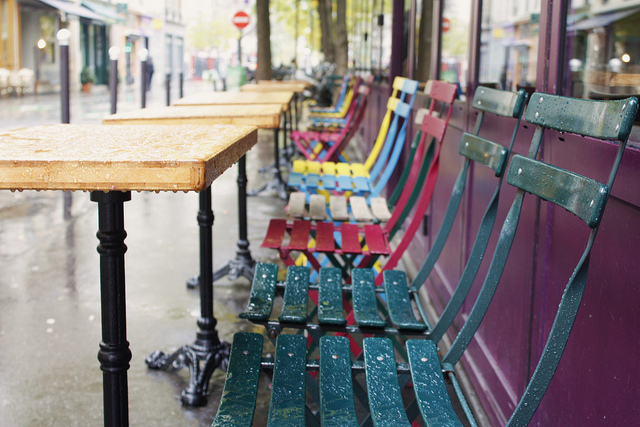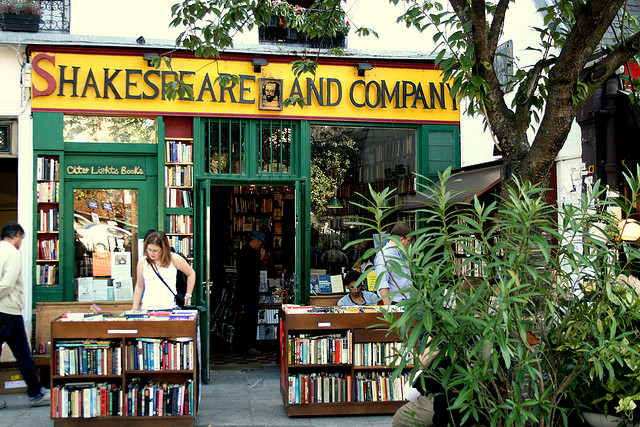When I first settled in Paris, one of the most stressful aspects to adapting to my new life was the linguistic transition. Seven years of French language exposure only equipped me with the necessary skills to excel in simulated classroom conversations but the moment I was in a situation where I had to speak unprepared to a real, living, breathing French person I crumbled in panic and self-doubt. It was on my first date with my husband that I realized I wasn’t as impressive as I thought. Five years and the ability to fool even the Frenchiest of French people later, I can say with confidence that I’m bilingual.
But communicating coherently was only part of my battle. Making French friends was brutal, trying to find where I belonged was stressful and trying to reconcile the separation from family and friends from within a tiny studio apartment was isolating. French partner or not, Paris can break you down. That is, if you don’t use the bountiful resources at your disposal to get comfortable.
Several months ago I offered some suggestions on how to become an expat in France. Now, inspired by the requests of several readers, I’ve put together 6 tips with the help of my friend and blogger, Bryan Pirolli, on how to adapt to Paris living once you’ve arrived. Keep in mind, breaking out of your shell and adopting a thick skin will be crucial.
Bryan’s tips:
** Don’t expect ever to be fully integrated or adapted. The more you try, the more frustrated you’ll become. The quicker you realize that Paris is a cosmopolitan city made up of people from all over the world, the less you’ll have to stress about “fitting in” and you’ll find your own “adaptation groove” more naturally, at your own pace. No amount of six-week language courses will make you more French, they’ll just make sure you can ask for a baguette in any tense.
** Take every anecdote and bit of advice with a grain of salt, otherwise you’ll probably get a bit freaked out. We all love helping by sharing our down and out experiences, but no two expat stories are alike. The headaches and tears shed by one expat while at the bank or post office should not dictate your expectations. Keep an open mind about everything and know that your story will be your own regardless of how many people have terrible experience at familiar haunts like the préfecture de police.
** Network freely and without hesitation. So many people think that the best way to assimilate is to avoid other expats, other English-speakers or anyone who is not French (hah…good luck!). On the contrary, I have found many of my best French and French-speaking friends through English-speaking connections. Don’t be so quick to dismiss that Australian or Brit at the bar because they are speaking English – they may be your key into a social circle that you didn’t even know existed.
Lindsey’s Tips
** Building off Bryan’s last point, some of the best places to meet people quickly aren’t actually bars. For quick contacts, target the expat associations, social meet-up groups and professional organizations like Message (for mothers), Expat Meet-Up, InterNations, the IABC (International Association of Business Comomunicators) and others specific to your country of origin. Shakespeare and Company, the independent bookstore and former literary nest of legends like Hemingway and Joyce, is one of the most popular spots in Paris to meet native English-speakers and locals and rub elbows with talented writers. They hold frequent events, readings and concerts, and always boast a packed house so you’ll have no shortage of potential contacts.
** Head to the market. Doing your food shopping in the supermarket requires very little interaction with others (except in the case of communal complaining at poor service and empty shelves). Instead, hit up the open-air markets in Paris where you’ll find yourself forced to simultaneously engage with merchants and practice your French. That said, do not underestimate the importance of building your language skills. The French may speak English (at varying levels) but the people I know who have fluttered through Paris without really challenging themselves linguistically missed out on so much of the experience. The market is a great place to start and remember, building your French food lexicon is just as important as having the right words to yell at the window panel marketers who incessantly call your house (it will happen).
** Become a local. How? Parisians are loyal to their neighborhood merchants. Once they pinpoint the best bakery and ethnic food store, tastiest local café and most reliable tailor, they frequent them religiously. Do the same – identify your local favorites and get to know owners, waiters and neighbors. Seeing the same faces in your arrondissement and making yourself known to them indicates you’re doing more than just passing through – you’re a serious adopted-Parisian and therefore potentially more interesting. If the French words don’t come easily, make friends with local shop owners in English. It’s wise to gauge their reactions when you engage them but genuine friendliness and interest will almost always win the hearts of even the most cantankerous of Parisians.
These tips offer the groundwork to making your long-term transition into Paris as smooth as possible. These are things we remind ourselves of often, even after reaching the point where we both feel like we’ve mastered this city, and should help you prepare mentally. If you have specific questions about adapting to Paris life, leave them in the comments section and Bryan and I will get back to you!












